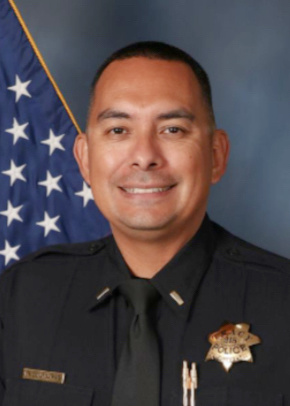Lt. Contreras manages the Police Department’s Community Services Division to include Traffic, School Resource Officers, Neighborhood Resource Officers, Code Enforcement, Homeless Outreach, Crime Prevention, DARE and Volunteer Programs. He also serves as Crisis Response Unit – SWAT Commander.
What motivated you to be a LEPSL ambassador?
The hardest part of the program was just getting started. I feel I can break down any mental barriers an individual may have if he or she is considering earning a LEPSL master’s degree. I proudly wear my USD class ring each day as a symbol of the excellent education, network and experience I gained from the LEPSL program.
Why did you choose the LEPSL program? What made LEPSL stand out in comparison to other schools/programs?
Before entering the program, I had viewed a zoom workshop regarding homelessness which was hosted by Dr. Fritsvold and LEPSL instructors. I was very impressed by the valuable content and relevant knowledge each presenter offered as it related to homelessness today. The fact the professors were subject matter experts and were a part of the LEPSL program, stood out in comparison to other schools I had researched. I knew USD was the school for me.
What were your concerns about starting a graduate program?
The initial concern was obtaining my previous transcripts from the colleges I had attended. I also did not understand the workflow and general time frame for the program. I was also concerned with completing financial aid documents and being able to package all the required items together. Having a counselor or advisor was definitely helpful. I later appreciated how the program was developed with the working law enforcement officer in mind.
How did the LEPSL program help you achieve your career goals?
With the LEPSL degree, I have put myself in a stronger position to compete for promotional opportunities. I also have increased my knowledge as it applies to understanding the law enforcement profession. Personally, one of the greatest feelings is to be able to set an example and show my wife and children that the hard work I put into the LEPSL program paid off.
What advice would you share with prospective LEPSL applicants?
Continually challenge yourself and strive to improve who you are. As law enforcement leaders we set the standard and the bar for our profession. Education is a critical component of our profession. More importantly, we as a profession do not work in silos and each of us is experiencing the same challenges in the law enforcement profession. LEPSL and the University of San Diego education system are a linchpin to networking and obtaining the knowledge needed for 21st Century policing.
What was your favorite LEPSL course?
My favorite, and perhaps more difficult course, was LEPSL 570 Public Policy. The most unexpected part of the course was the teamwork aspect. Prior to this course, I was used to working solo and participating in group discussions. Drafting an MOU with my three group members who were located in Southern CA, Florida and Washington was logistically challenging yet fun. Our team met over Zoom and utilized What’s App to work together and complete our project. Our instructor Lt. Greg Morgan was very critical of our assignments throughout the class but this only benefited us in the end when we obtained an A grade on our group assignment.
What were you balancing while participating in the LEPSL program?
Balancing LEPSL was an understatement for me. I had numerous responsibilities at work, some were politically driven to include standing up a homeless outreach program and bringing together multi-agency and inner department teams to address homeless encampments. I managed over 40 professional and sworn staff thus my daytime job did not stop. In essence, I live by a calendar at work. Serving as a SWAT Commander, I was also frequently called out to address incidents after hours. I also had my family commitments to include two sons playing high school football and baseball. If needed the professors were understanding and worked with me and provided additional time to turn in assignments after I shared any relevant time or work challenges I had faced. The program is built for working professionals and I appreciated having the weekends to complete assignments to turn in the following Monday.
How did you stay motivated throughout the program in the face of competing priorities in your life?
Each course does go by fast and I generated a routine for completing my assignments and participating in discussions. Knowing the other students were facing the same challenges I was experiencing created an informal brother/sisterhood. I was surrounded by overachievers and those who were set on improving their craft which served as a constant motivator for me.
LEPSL Graduating Class
2024
